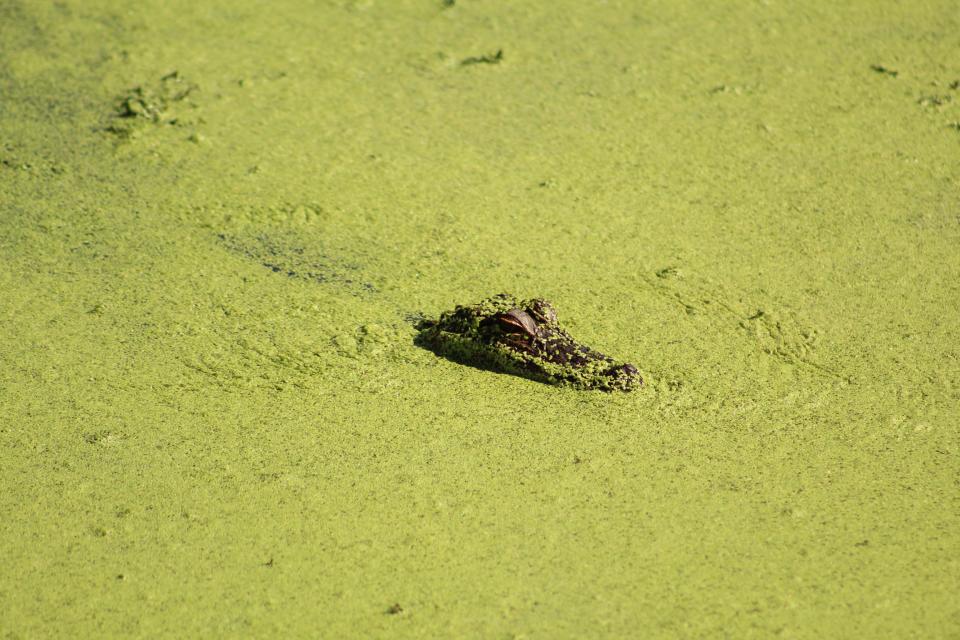Think you know everything about alligators? Check your knowledge here, Florida
The American Alligator is the official state reptile of Florida. Some residents fear them, and many residents love them. After all, they are the mascot of our beloved, local, Florida Gators. Here are some facts about alligators locally and across the state that you may not have known.

Just how many alligators are there in Florida?
The Florida Fish and Wildlife Conservation Commission says there are about 1.3 million alligators living throughout the state's 67 counties.
From earlier this year: Viral video shows 10-foot alligator on Florida golf course just ahead of mating season
Is there reason to fear alligators?
According to a report from the University of Florida Institute of Food and Agricultural Sciences UF/IFAS in May, no. That is, as long as you leave them alone.
“The reasons to fear alligators are unfounded, as they are not aggressive beasts, although as large predators they should be respected,” Frank Mazzotti, professor of wildlife ecology at UF/IFAS Fort Lauderdale Research and Education Center (FLREC), wrote in the report.
As the USA TODAY NETWORK-Florida has reported, over the past 10 years, the FWC confirmed that Florida has averaged eight unprovoked alligator bites per year that are serious enough to require professional medical treatment.
Actually, the report says that alligators play a crucial role in the ecosystem particularly in the Everglades' ecology.
More: UF/IFAS shares insights on why it's great to be a Florida gator
How are alligators helping the Everglades?
UF/IFAS experts said that alligators have been chosen as one of the species to be used to evaluate restoration progress. This means that healthy restoration in the Everglades should result in fatter alligators and increased alligator populations.
Additionally, alligators are top predators that depend on the density of aquatic and semi-aquatic organisms, provide habitats for various plants and animals, and indicate a need for natural freshwater flow.
Were alligators ever endangered?
Yes. Alligators were once hunted to the point of extinction for their hides and have made a comeback, in part, because of protection under the Endangered Species Act and through commercialization for their hides and meat.
When can you hunt alligators?
Florida has strict rules when it comes to alligator hunting. A person can receive a maximum of two Convention on International Trade in Endangered Species (CITES) tags, which allows them to harvest one alligator per tag. The FWC says alligators can be harvested during certain periods between Aug. 15 and Nov. 1.
A unique heart
The FWC says alligators and crocodilians are unique from other reptiles because of their 4-chambered hearts, similar to those of mammals and birds. Most reptiles have 3-chambered hearts.
A 4-chambered heart allows oxygenated blood and deoxygenated blood to be separated, which results in more efficient respiration needed for the high metabolism of warm-blooded animals. However, Crocodilians have evolved a shunt between the left and right aorta (immediately above the ventricles) to facilitate the mixing of oxygenated and deoxygenated blood.
Some scientists have hypothesized, according to the FWC, that their complex heart structure may indicate they evolved from warm-blooded ancestors.
Many alligator nests don't survive
The FWC says that about one-third of alligator nests are destroyed by predators (mostly raccoons) or flooding. For nests that survive, an estimated 24 live hatchlings will emerge and only 10 alligator hatchlings will live to one year.
The average clutch size (number of eggs) of a nest is 38, the FWC says.
More gators: This Florida lake could be home to 30,000 alligators. Here are lakes with highest gator counts
Which local lake ranks No. 2 in Florida for number of gators?
Orange Lake, which the FWC says is the largest lake in the region. It spans both Alachua and Marion counties, ranking second in Florida in terms of number of alligators, with its 12.550 acres containing approximately 2,732 alligators, according to the A-Z Animals Blog.
More gators: Lake between Ocala/Gainesville is No. 2 in Florida for number of gators. Which is No. 1?
Which lake is No. 1 in Florida?
According to a USA TODAY NETWORK-Florida report, the No. 1 lake for alligators in Florida is Lake Okeechobee. It is Florida’s largest freshwater lake and borders five counties. It has 9,308 counted alligators and an estimated population of about 30,000.
Any honorable mentions?
Lake George, in Volusia County, ranks third with 2,660 alligators; Lake Jesup, in Seminole County, ranks fourth with 2,414 alligators and an estimated population around 13,000; and Lake Kissimmee, in Osceola and Polk Counties, ranks fifth with 2,065 alligators.
Where else can alligators be found?
Alligators are located from southeast Oklahoma and east Texas on the western side of their range to North Carolina and Florida in the east. The FWC says while they prefer fresh water lakes and slow-moving rivers and their associated wetlands, alligators also can be found in brackish water habitats.
The USA TODAY NETWORK-Florida's Samantha Neely contributed to this report
This article originally appeared on The Gainesville Sun: All about the alligator in Gainesville and the rest of Florida

